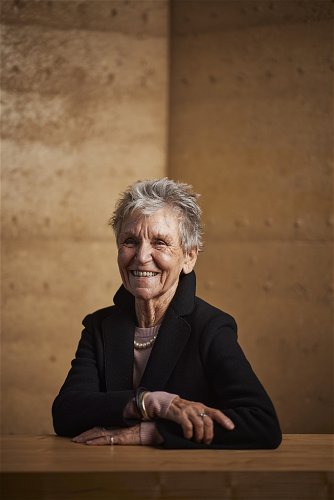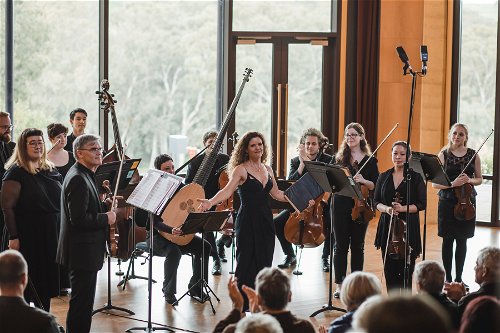
Artists L–R: Zoë Barry, cello; Aviva Endean, clarinets; Sunny Kim, voice, electronics, percussion; Gelareh Pour, kamancheh, qeychak, voice; Mindy Meng Wang, guzheng. Photo: Matt Byrne
Sunny Kim and Ensemble Ochaye Residency
MONDAY 12–Friday 16 August 2024
WATER SONG
In August 2024, Sunny Kim and Ensemble Ochaye spent a week in residence at UKARIA developing their project Water Song.
'Water Song is a collaboration in music, sound and story by some of Australia's most exciting musicians and improvisers. Inspired by our most precious liquid, the language of Water Song moves between sonic sensuality and personal mythologies in a musical and cultural interplay of forms which promises something entirely new in Australian art and storytelling.'
Sunny Kim | Voice, electronics, percussion
Aviva Endean | Clarinets
Gelareh Pour | Kamancheh, voice
Mindy Meng Wang | Guzheng
Zoë Barry | Cello
Tamara Saulwick | Dramaturg
Wendy Martin | Producer
Commissioned by Perth Festival, Adelaide Festival, Asia TOPA, Arts Centre Melbourne and Melbourne Recital Centre. Supported by UKARIA Cultural Centre.
Water Song is being premiered in 2025 – please see the details below.
World Premiere season
Perth Festival
26–27 February 2025
Asia TOPA @ Melbourne Recital Centre
7 March 2025
6.00pm and 9.00pm
Our Communications team, Rachel Bruerville and Tahlia Williams, interviewed Sunny Kim about the mythologies behind Water Song, and Ensemble Ochaye’s collaborative process.
What have you been up to since you were last at UKARIA in 2022 for Aviva Endean’s residency, The Cloud Maker?
A lot has been happening! The Cloud Maker was awarded Performance of the Year at the 2023 Art Music Awards. The music, which we developed at UKARIA, was later performed in Adelaide and Melbourne. It was an incredible journey. We felt deeply nurtured by the surroundings – the beautiful landscape and the history of the music that’s already been played in that hall. Creating that music in this environment, and then having it heard by so many people and recognised in this way, was really fulfilling.
Now, in this 2024 residency, we’re thinking about water and the messages it holds for us, exploring its symbolism from multicultural perspectives. We have a stellar group of Australian artists from diverse cultural backgrounds: Mindy Meng Wang on guzheng (Chinese zither), Gelareh Pour on kamancheh (an Iranian string instrument) and vocals, Zoë Barry on cello, Aviva Endean on clarinets, and myself, contributing vocals and percussion.
I’ve asked each artist to bring stories about water – whether from their personal lives or cultural heritage. Through these stories, we’re discovering different perspectives on water and finding connections in how it holds us together. The theme of water is giving us a powerful framework to explore both our shared and individual experiences.
With a focus on diverse musical and cultural traditions, how does Ensemble Ochaye seek to find unity through music?
This group has worked together before in a similar fashion, except for the previous work MotherSong, MotherLand (previously titled MotherTongue, MotherLand), we didn't have Zoë. In that project, we explored themes of motherhood and migration, drawing on many diasporic stories. Through sharing these experiences, we found deep connections. For example, something Aviva shared about her grandfather mirrored what my partner is going through now. And Helen Svoboda, who was with us for the early stages, talked about not knowing English on her first day of kindergarten – a story that’s the same as my daughter’s.
These themes of motherhood and migration gave us a framework to connect across cultures. Water, this time, offers a similar theme – universal, yet multifaceted. It allows us to dive into stories that are both personal and collective, opening up so many layers for us to explore together.
What are some of the ‘personal mythologies’ around water that have surfaced during your collaboration so far?
Many beautiful stories have come up. Just this morning, we had an incredible story-sharing session outside in the garden, surrounded by sunshine and this gorgeous environment. One mythology that emerged was about water as a symbol of protection and safety. In Iranian culture, for instance, when a loved one embarks on a journey, you throw a bucket of water behind them as a blessing for a safe return. Gelareh shared that she always has her family throw water behind her as she leaves for each tour.
In Korean mythology, we have the story of Princess Bari, a goddess with a profound connection to water. She was cast into the sea as an infant, and throughout her saga, water symbolizes different things – danger, vitality, and transition. At one point, she searches for the water of life in the land of the dead and encounters a river that separates the living from the dead, carrying the souls of the deceased.
We’ve also talked about water as a metaphor for emotions – tears, rivers of grief – and how water sustains and connects us. It’s fascinating to explore these different dimensions, especially at a time when the world is facing climate change and environmental crises. Water is not only symbolic but deeply relevant to our shared human experience.
Dramaturg Tamara Saulwick is working alongside Ensemble Ochaye on this project. What role does literature, drama and storytelling have in Water Song?
The first step in this project was collecting stories from these wonderful women. Tamara and I then sat with these stories and began to curate them, shaping which ones to focus on during the residency. Once the musical ideas take shape, we’ll enter additional development phases where we’ll integrate the narrative elements into a cohesive performance.
Tamara will join us in September to explore how we can bring a bit of theatricality into our performances. Water, as a theme, is full of action words – washing, pouring, splashing – so we’re curious about how we can incorporate physicality and movement into the work. Tamara and I will continue to curate the story and music, shaping the overall structure. In February 2025, we’ll have intensive rehearsals in Melbourne to bring everything together and see how it all sounds.
I think there's some rain due in the next few days, so it will be interesting to see the inspiration of the environment on your work!
Yesterday, we had a moment where everyone performed solos for each other, and I actually sang a rain song. In Korean culture, there’s a long tradition of singing for a good year of rain, so who knows – maybe it will work!
But beyond that, these old traditions remind us of how closely we are connected to nature, and how vital it is to reflect on these connections – especially now, as we face environmental challenges globally. Our work in this residency is about more than just music; it’s about understanding our place in the world and exploring how art can help us connect the past, present, and future.
If you’d like to find out more about Sunny Kim’s projects, please visit her website: sunnykimmusic.com



 012.jpg?class=grid1)






